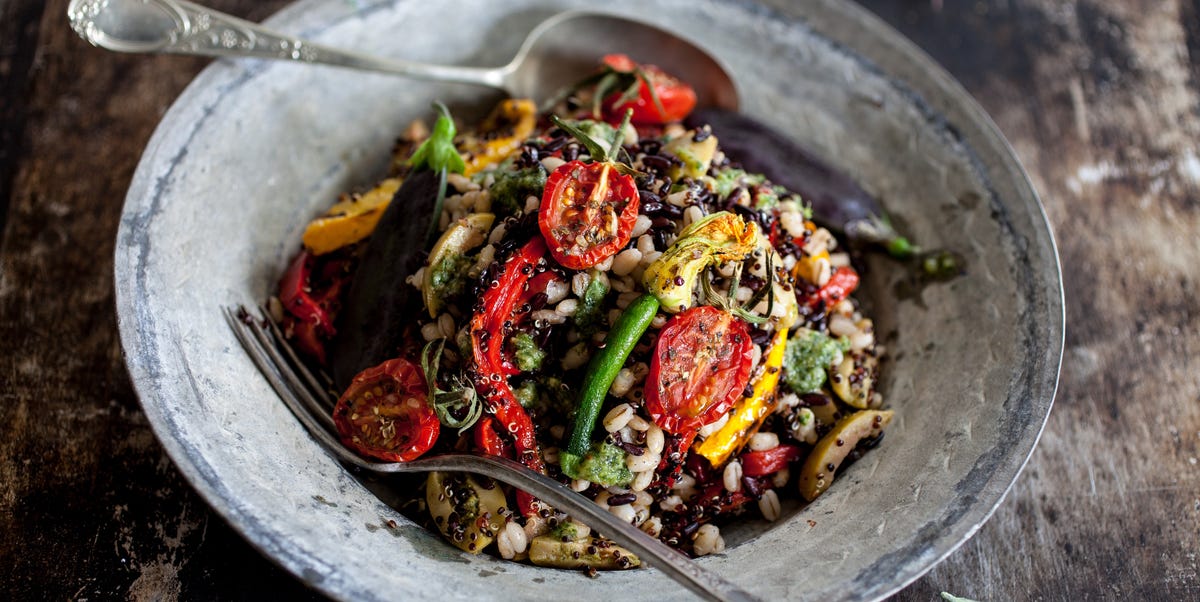We often hear carbs referred to as the ‘King of Fuel’ – not only vital to include as part of our everyday eating habits, but also crucial for regular training, performance and recovery.
Yet, while that phrase is often thrown around, it doesn’t necessarily capture the details of which carbs are the best – because they certainly aren’t all created equally.
It’s, well, a little more complex than that.
What to read next
Complex Carbs vs Simple Carbs
‘Carbohydrates are the body’s primary energy source, but the type of carbohydrate matters greatly for energy, digestion and overall wellbeing,’ says Nutritionist Resource member Evie Whitehead, who specialises in digestive and gut health.
‘Simple carbohydrates are sugars composed of one or two molecules, eg, table sugar, white bread, sweets. They are digested quickly, causing rapid blood sugar spikes and crashes,’ explains Whitehead. ‘Complex carbohydrates contain long chains of sugar molecules – starch and fibre. They digest more slowly, provide sustained energy and feed beneficial gut bacteria via prebiotic fibres.’
She adds that it’s the fibre, vitamins, minerals and phytonutrients in complex carbs that make them far superior to refined carbs, both in terms of blood sugar regulation and gut microbiome balance.
How Many Complex Carbs Should You Eat a Day?
That will depend on activity levels, body composition and health goals, says Whitehead, but ‘for most adults, 45-55% of daily calories from carbohydrates is well-supported.’
What does that look like in terms of actual food? ‘A balanced approach often means three to six fist-sized servings of complex carbs daily, spread across meals and snacks,’ says Whitehead. ‘For gut health, aim for a variety of fibre-rich carb sources, minimum 25-35g fibre per day – diversity feeds different species of beneficial bacteria, improving gut resilience and digestion.’
If you’re training regularly, particularly for an endurance event like a marathon, you’ll need to adapt your carb intake accordingly – which is often easier said than done. For instance, it’s well known that runners habitually under-fuel when it comes to carbohydrates, with some experts suggesting that the current recommendations should be significantly increased. The key message here: never underestimate the power of carbs.
But while carb-based fuel used during endurance exercise often tends to consist of refined, processed carbs, like running gels (although longer endurance events require more creativity and diversity), we’re talking about whole food complex carbs here – and how they can play a part in both your everyday diet and fuelling strategies.
Below, Whitehead has listed and categorised the healthiest complex carbs to get on your nutrition radar.
10 Healthiest Complex Carbs for Gut and Energy
1. Oats – Soluble fibre (beta-glucan), which helps reduce cholesterol and supports microbiome balance.
2. Legumes (lentils, chickpeas, beans) – High in resistant starch, boosting short-chain fatty acid production vital for gut health.
3. Sweet potatoes – Nutrient-dense with low glycaemic index and supports steady energy release.
4. Quinoa – Complete plant protein and excellent alternative to refined grains (eg, white bread).
5. Barley – Abundant resistant starch to fuel gut bacteria.
6. Apples and pears – Soluble pectin fibre especially good for colon health.
7. Brown rice – Easy to digest and provides slow energy release without blood sugar spikes.
8. Berries – Source of fibre and natural polyphenols that act as prebiotics.
9. Buckwheat – Gluten-free, rich in minerals and a gut-friendly fibre.
10. Whole grain rye bread (true sourdough preferred) – Dense fibre supporting regular bowel movements.
Best Complex Carbs for Workouts and Recovery
For pre-workout fuel
Opt for easily digestible carbs with a moderate glycaemic index, eg, oats, banana with oats, sweet potato, brown rice. These provide steady energy without gut discomfort.
For post-workout recovery
Combine complex carbs with protein to replenish glycogen and aid muscle repair. Ideal choices include: quinoa with salmon, lentil stew with brown rice, or whole grain toast with eggs and avocado.
Adding colourful vegetables also increases antioxidants, which help reduce inflammation linked to intense exercise.
Complex Carb Meal and Snack Ideas
- Breakfast: Oats, buckwheat pancakes, whole grain sourdough toast with avocado, or quinoa porridge.
- Lunch: Lentil or chickpea salads, brown rice bowls with vegetables, or whole grain wraps.
- Dinner: Roasted sweet potatoes, barley risotto, or quinoa with roasted vegetables and olive oil.
- Snacks: Hummus with whole grain crackers, apple slices with nut butter, or oatcakes.
Add some protein and Bob’s your uncle.
Your options certainly aren’t limited to these, but the foods listed here demonstrate how important dietary diversity is – particularly if you regularly work out.
Hannah Bradfield is a Senior Nutrition Writer across Women’s Health UK and Men’s Health UK. An NCTJ-accredited journalist, Hannah graduated from Loughborough University with a BA in English and Sport Science and an MA in Media and Cultural Analysis.
She has been covering sports, health and fitness for the last five years and has created content for outlets including BBC Sport, BBC Sounds, Runner’s World and Stylist. She especially enjoys interviewing those working within the community to improve access to sport, exercise and wellness. Hannah is a 2024 John Schofield Trust Fellow and was also named a 2022 Rising Star in Journalism by The Printing Charity.
A keen runner, Hannah was firmly a sprinter growing up (also dabbling in long jump) but has since transitioned to longer-distance running. While 10K is her favoured race distance, she loves running or volunteering at parkrun every Saturday, followed, of course, by pastries. She’s always looking for fun new runs and races to do and brunch spots to try.
